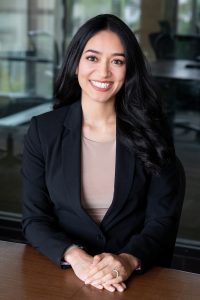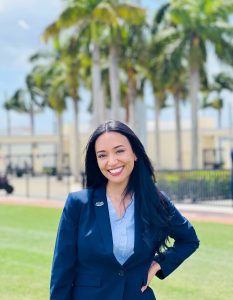On May 9-10, UW–Madison and the School of Education will celebrate its latest cohort of talented graduates with 2025 Spring Commencement celebrations. Ahead of this big weekend, we reached out to a few of our graduating students to learn more about their accomplishments, time at UW–Madison, and future plans.

Nicole Contreras-García, who is graduating with a PhD from the Department of Educational Leadership and Policy Analysis, is a first-generation college student who began her studies at Río Hondo College in Los Angeles County before transferring to UCLA and becoming an award-winning scholar.
Contreras-García received the 2025 Outstanding Doctoral Student Award for her impactful research on equitable student outcomes and leadership as a Council for the Study of Community Colleges graduate representative. Her work, published in Teachers College Record and the Community College Journal of Research and Practice, advances support for underserved community college student populations.
“These unique perspectives — blending lived experience with rigorous research — has produced groundbreaking insights into equity gaps in transfer pathways,” Brian Burt, a professor with the Department of Educational Leadership and Policy Analysis, said of Contreras-Garcia’s work. “Through mentoring students who share her background, disseminating transformative research nationwide, and contributing to NSF-funded studies, Nicole turns scholarship into meaningful institutional change.”
This fall, Contreras-Garcia will be joining the faculty at Florida Atlantic University as an assistant professor of higher education leadership.
Read on to learn more about Contreras-García and her time with the School of Education’s Department of Educational Leadership and Policy Analysis.
Where are you from, and what brought you to UW–Madison?
I’m from Whittier, California, and I came to UW–Madison because I was really drawn to the faculty and the work they do in the Department of Educational Leadership and Policy Analysis. From what I knew at the time, the program’s structure and opportunities felt like the right fit, and once I got here and settled, I knew that I made the right choice. Honestly, I didn’t completely know what the School of Education was all about when I first applied, but now I’m leaving with a deep appreciation for what it signifies, and with training that’s challenged and prepared me in all the right ways.
What are your research interests?
My research broadly focuses on how institutions and their faculty, staff, and leaders create conditions that support student success, particularly for minoritized students at community colleges. My agenda is informed by my lived experience as a community college transfer student and working at a community college as a mentor and student assistant. My passion for this area was deepened during my time at UW–Madison, where I’ve had the privilege of contributing to multiple research projects under the guidance of my brilliant advisor and mentor, Dr. Xueli Wang (the Barbara and Glenn Thompson Endowed Professor in Educational Leadership). Through these collaborations, I have been able to work on equity-focused projects that span topics like faculty-led transfer partnerships, holistic support for student mental health, racial equity in transfer pathways, and community colleges’ contribution to student growth and development.
My mixed methods dissertation, “‘Dodging Around It:’ How Racialized Institutional Conditions at Community Colleges Impact Transfer for Students of Color,” interrogates existing policies and other institutional conditions at a partner community college that may contribute to racial disparities in transfer access and outcomes for students of color. With the support of incredible mentorship, each project brought about new research skill sets, personal reflections, and insights into the inner workings of community colleges.
What was your most meaningful experience at UW–Madison?

The most meaningful experience was working with Dr. Xueli Wang on her transformative mixed methods project focused on community college student success and mental health. For the first time, I interviewed community college students and facilitated focus groups, hearing their stories of vulnerability and power had a profound impact on me. I still treasure those interviews and feel inspired by each student who chose to persist despite facing some overwhelming barriers. The other reason why this project meant so much to me is the way the project developed over time and how it was facilitated by Dr. Wang. She led our research team to build an organic space that prioritized mutual care, support, and deep reflection. I came to realize that research is so much more than just what we study, but just as importantly, how we go about studying it with the utmost respect and humanity. Her commitment to holistic support across all of her roles has taught me how to find the joy in the research process and what it takes to bring meaningful and high quality research to life. I am forever grateful.
What’s next for you? What are your plans for the future?
I will be joining the wonderful faculty at Florida Atlantic University as an assistant professor of higher education leadership this fall. I am excited to continue pushing my research agenda forward in collaboration with community colleges and colleagues, along with supporting master’s and doctoral students along their own journeys.
Thinking about the principle of the Wisconsin Idea, how will you use what you have learned at UW–Madison to influence other people’s lives or positively impact our world?
Being on the receiving end of such high-quality mentorship and advising, I feel incredibly indebted. I was fortunate to train with scholars who are not only deeply respected, but who also lead with care and compassion. With that comes a responsibility to carry forward the idea that education is most powerful when we see and engage with the whole person. Because I’ve received this kind of support, I understand what it means and how much it matters. I’m committed to continuing what I’ve learned and honoring what my mentors have done for me: tailoring support based on individual and collective needs, adapting our approaches to meet those needs, building meaningful connections with our surrounding communities, and growing alongside those we work with toward a more equitable education system that reaches beyond institutional walls.